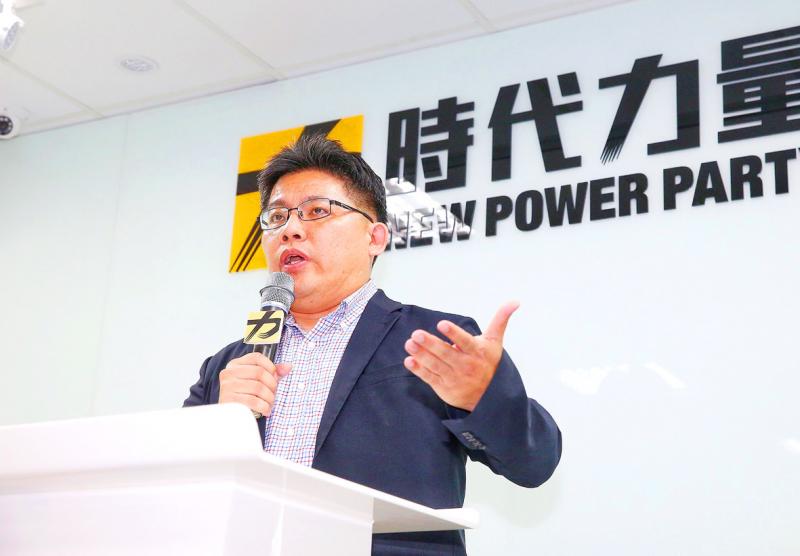Former New Power Party (NPP) chairman Hsu Yung-ming’s (徐永明) withdrawal from the party over his alleged involvement in a corruption scandal failed to appease some young members, with two Taipei city councilors saying that they have also withdrawn from the party in protest of its handling of Hsu’s case
Hsu was on Tuesday released on bail of NT$800,000.
The party confirmed that it had received Hsu’s application to leave the party via fax at 3:50pm yesterday before its Disciplinary Committee’s scheduled meeting at 5pm.

Photo: CNA
Within an hour of the party receiving Hsu’s application, Taipei city councilors Lin Ying-meng (林穎孟) and Huang Yu-fen (黃郁芬) issued a statement, saying that they were leaving the party, too.
“As independent legislators, we would continue to oversee the Taipei City Government and residents in the city,” they said.
The two said that they joined the relatively young party and ran in local elections to reform politics in Taiwan, so that more young people’s voices could be heard.
However, the party forgot why it was formed and instead inherited many corrupt political practices, they said.
“The party management often used the news media to launch mudslinging campaigns against members with different opinions from theirs, which has already caused several legislators to leave the party,” they said.
“We have tried our best to communicate with the party’s senior management. Not only were our opinions ignored, but we were at the receiving end of unsubstantiated and fabricated allegations. The same thing happened again when the party tried to weather the crisis caused by Hsu’s alleged involvement in the corruption scandal,” they said.
The way the party handled Hsu’s case also made the public question whether it has double standards when it deals with members who contravene party regulations, they said, adding that the punishment and penalties were decided based on the people involved in the transgressions, rather than the transgressions themselves.
Acting NPP Chairman Chiu Hsien-chih (邱顯智) said that the Disciplinary Committee has moved to dismiss Hsu’s case, as he is no longer a party member, adding that it would leave investigations to the prosecutors.
In view of the incident, the party would in two weeks present a code of ethics and a plan to reform, he said.

The Ministry of Economic Affairs has fined Taobao NT$1.2 million (US$36,912) for advertisements that exceed its approved business scope, requiring the Chinese e-commerce platform to make corrections in the first half of this year or its license may be revoked. Lawmakers have called for stricter enforcement of Chinese e-commerce platforms and measures to prevent China from laundering its goods through Taiwan in response to US President Donald Trump’s heavy tariffs on China. The Legislative Yuan’s Finance Committee met today to discuss policies to prevent China from dumping goods in Taiwan, inviting government agencies to report. Democratic Progressive Party Legislator Kuo Kuo-wen (郭國文) said

The Ministry of Economic Affairs has fined Taobao NT$1.2 million (US$36,900) for advertisements that exceeded its approved business scope and ordered the Chinese e-commerce platform to make corrections in the first half of this year or its license would be revoked. Lawmakers have called for stricter supervision of Chinese e-commerce platforms and more stringent measures to prevent China from laundering its goods through Taiwan as US President Donald Trump’s administration cracks down on origin laundering. The legislature’s Finance Committee yesterday met to discuss policies to prevent China from dumping goods in Taiwan, inviting government agencies to report on the matter. Democratic Progressive Party

Taiwan and its Pacific ally Tuvalu on Tuesday signed two accords aimed at facilitating bilateral cooperation on labor affairs, according to Taiwan’s Ministry of Foreign Affairs (MOFA). The governments inked two agreements in Taipei, witnessed by Foreign Minister Lin Chia-lung (林佳龍) and visiting Deputy Tuvaluan Prime Minister Panapasi Nelesone, MOFA said in a news release. According to MOFA, the agreements will facilitate cooperation on labor issues and allow the two sides to mutually recognize seafarers’ certificates and related training. Taiwan would also continue to collaborate with Tuvalu across various fields to promote economic prosperity as well as the well-being of their

Sung Chien-liang (宋建樑), who led efforts to recall Democratic Progressive Party (DPP) Legislator Lee Kun-cheng (李坤城), was released on bail of NT$80,000 today amid outcry over his decision to wear a Nazi armband to questioning the night before. Sung arrived at the New Taipei District Prosecutors’ Office for questioning in a recall petition forgery case last night wearing a red armband bearing a swastika, carrying a copy of Adolf Hitler’s Mein Kampf and giving a Nazi salute. Sung left the building at 1:15am without the armband and covering the book with his coat. Lee said today that this is a serious